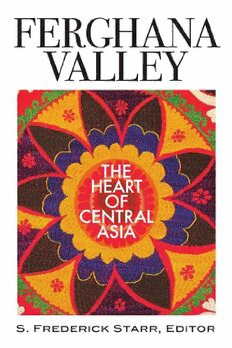
Ferghana Valley: The Heart of Central Asia PDF
465 Pages·2011·3.448 MB·English
Most books are stored in the elastic cloud where traffic is expensive. For this reason, we have a limit on daily download.
Preview Ferghana Valley: The Heart of Central Asia
Description:
With some twelve million inhabitants, the Ferghana valley is one of the most densely populated places in the world. It is also the most volatile region of formerly Soviet Central Asia. Not only is the area ethnically and linguistically diverse, it is politically divided, with parts ruled by three different states--Uzbekistan, Tajikistan, and the Kyrgyz Republic--whose distant capital cities all relegate Ferghana to their respective peripheries.These complexities make a comprehensive, multidimensional understanding of the Ferghana region all the more elusive. In order to construct this analysis, the Central Asia-Caucasus Institute assembled an international, interdisciplinary team of experts on the region. Their carefully planned, collaboratively authored chapters cover the historical and topical terrain with unmatched depth and breadth and balance.Selected Contents:AcknowledgmentsIntroducing the Ferghana Valley, S. Frederick Starr1. The Ferghana Valley: The Pre-Colonial Legacy, Abdukakhor Saidov (Tajikistan), with Abdulkhamid Anarbaev (Uzbekistan) and Valentina Goriyacheva (Kyrgyz Republic)2. The Rise and Fall of the Kokand Khanate, Victor Dubovitskii (Tajikistan), with Khaydarbek Bababekov (Uzbekistan)3. Colonial Rule and Indigenous Responses, 1860-1917, Ravshan Abdullaev (Uzbekistan), with Namoz Khotamov (Tajikistan) and Tashmanbet Kenensariev (Kyrgyz Republic)4. Soviet Rule and the Delineation of Borders in the Ferghana Valley, 1917-1930, Sergey Abashin (Russia), with Kamoludin Abdullaev (Tajikistan), Ravshan Abdullaev (Uzbekistan), and Arslan Koichiev (Kyrgyz Republic)5. The Ferghana Valley Under Stalin, 1929-1953, Kamoludin Abdullaev (Tajikistan), with Ravshan Nazarov (Uzbekistan)6. The Ferghana Valley in the Eras of Khrushchev and Brezhnev, Ravshan Nazarov (Uzbekistan), with Pulat Shozimov (Tajikistan)7. Cultural Life in the Ferghana Valley Under Khrushchev and Brezhnev, Zukhra Madamidzhanova (Tajikistan), with Ildar Mukhtarov (Uzbekistan)8. The Ferghana Valley During Perestroika, 1985-1991, Pulat Shozimov (Tajikistan), with Baktybek Beshimov (Kyrgyz Republic) and Khurshida Yunusova (Uzbekistan)9. A New Phase in the History of the Ferghana Valley, 1992-2008, Baktybek Beshimov (Kyrgyz Republic), with Pulat Shozimov (Tajikistan) and Murat Bakhadyrov (Uzbekistan)10. Economic Development in the Ferghana Valley Since 1991, Sayidfozil Zokirov (Uzbekistan), with Khojamahmad Umarov (Tajikistan)11. Land, Water, and Ecology, Christine Bichsel (Switzerland), with Kholnazar Mukhabbatov (Tajikistan) and Lenzi Sherfedinov (Uzbekistan)12. Culture in the Ferghana Valley Since 1991: The Issue of Identity, Pulat Shozimov (Tajikistan), with Joomart Sulaimanov (Kyrgyz Republic) and Shamshad Abdullaev (Uzbekistan)13. Islam in the Ferghana Valley: Between National Identity and Islamic Alternative, Bakhtiyar Babadjanov (Uzbekistan), with Kamil Malikov (Kyrgyz Republic), and Aloviddin Nazarov (Tajikistan)14. The Ferghana Valley and the International Community, Inomjon I. Bobokulov (Uzbekistan)Conclusion, S. Frederick StarrAbout the Editors, Authors, and Contributing AuthorsIndexComment(s): "Frederick Starr has again performed an invaluable service to the field of Central Asian studies. Bringing together scholars from the Kyrgyz Republic, Uzbekistan, and Tajikistan, he has edited a work that reveals the significance of a little-known region, the Ferghana Valley. As Central Asia is restored to the prominence it enjoyed during the era of the Silk Roads, this book becomes even more vital. The area's natural resources and geopolitical position ensure that it will play an important role in the twenty-first century, and Starr's work offers a splendid key to understanding of the region." -- Morris Rossabi, City University of New York and Columbia University"The Ferghana Valley lies at the core of the historical evolution, identity formation and, in the post-Soviet era, interstate challenges of Central Asia. This remarkable volume is the first to offer an integrated scholarly analysis of the importance of the region, drawing on the deep knowledge of local specialists of different backgrounds and disciplines. It brings to life the complex social and national diversity of the valley and its historical dependence on external forces. All those worried about the contemporary stability of Central Asia should read the nuanced arguments of this major study." -- Roy Allison, London School of Economics and Political Science"The genuinely scholarly analyses presented in the volume edited by Frederick Starr offer a timely response to the need of numerous analytical institutions, political leaders, and experts engaged in solving the problems of Central Asia to have full, unbiased, and ... first-hand knowledge of distinctive characteristics of the region's historical, cultural, and religious development." -- Mavlon Shukurzoda, www.12.uzReview(s): The team, under the coordination of S. Frederick Starr, initiated something exceptional which may not provide answers to the unrest, revolutions and ethnic conflicts which characterize the present situation, but can help the political leaders of the three countries that cover the Ferghana Valley better understand each other and find ways toward a peaceful and tolerant development in this multiethnic, multilingual, and multi-religious place. The Ferghana Valley is not just another book about this complex region... but is above all a multilateral documentation from the pre-colonial period, to the Soviet times with its arbitrary delineation of borders, until today. (continued below...)It covers economic development, religion and culture including those basic factors related to land, water and ecology that are central to the present disagreements between the three ruling states. It is indeed a fascinating and instructive read that will help to understand the expected progress of the region from different, sometimes opposing, points of view which may all facilitate in finding a harmonious compromise for the ongoing conflict. Central Asia, which may not have the world's attention, is brought to light with the insight of this think tank of scholars who examine and contribute toward solutions for the region's problems. The Times of Central Asia
See more
The list of books you might like
Most books are stored in the elastic cloud where traffic is expensive. For this reason, we have a limit on daily download.
